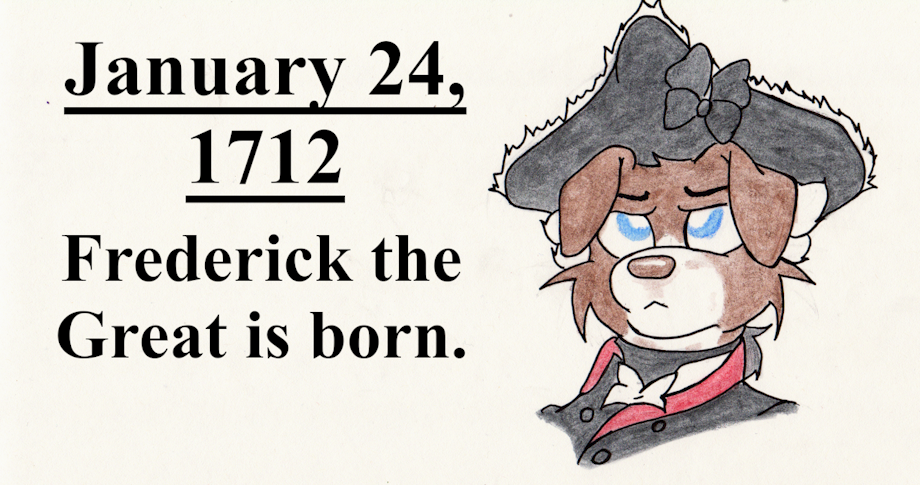On January 24, 1712, Frederick II of Prussia is born. Born in Berlin to King Frederick William I of Prussia and Sophia Dorothea of Hanover (sister of King George II of England), Frederick showed great interest in music and literature as a child; however, his father's short temper and preference for martial pursuits clashed with these interests, leading to beating and humiliation for Frederick at the hands of his father. Despite such abuse, Frederick secretly acquired a vast library of works, including classical Greek and Roman literature, and continued his studies. Following the death of his father, Frederick assumed the throne of Prussia in 1740 and with the powerful army and state his father had forged. Frederick II would become one of the "enlightened despots" of Europe, utilizing his power and authority as king enact many reforms championed by Enlightenment philosophers such as Voltaire (who was actually one of Frederick's close friends, though the relationship was at times strained due in no small part to Voltaire's personality) such as freedom of speech and the press, greater religious tolerance, allowed men who were not nobles to be appointed to certain high ranking government positions, and limiting the use of the death penalty. Frederick also proved an incredibly capable military leader, expanding Prussia's territory, influence, and importance throughout Europe on the battlefield. During his reign, Prussia would take Silesia from Austria, emerge victorious in the Seven Years' War, and divide Poland with Russia and Austria during the First Partition of Poland. Due to the changes, growth, and power he brought to Prussia, Frederick II would earn the title of Frederick the Great from his people.
After several years of ill health, Frederick the Great passed away at the Sanssouci palace in Potsdam on August 17, 1786, at the age of 74. Despite his request to buried at the palace next to his greyhounds, his nephew and successor Frederick William II entombed his body next to that of his father in the Potsdam Garrison Church. From here, the body was relocated to a salt mine by the Nazis to prevent the destruction of his remains. After the war, he was relocated multiple times until August 17, 1991. On the 205th anniversary of his death, Frederick the Great was quietly laid to rest in the crypt he had built at Sanssouci after lying in state with a guard provided by the modern German Bundeswehr.
Keywords
male
1,246,561,
anthro
236,342,
canine
201,964,
dog
181,213,
germany
393,
this day in history
248,
tdih
244,
prussia
13,
german shorthaired pointer
5,
january 24
1,
frederick ii
1,
frederick the great
1
Details
Published:
5 years, 10 months ago
25 Jan 2020 03:40 CET
Initial: 282ed01402c723fd18c1900d168d3eb5
Full Size: 72eb065b586ae4f45983754081887f80
Large: df9745a31f3e438a6b3fd4814665c89f
Small: 109b2d6908594f3e013175db59e6e5d3
Stats
20 views
5 favorites
1 comment
